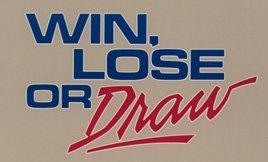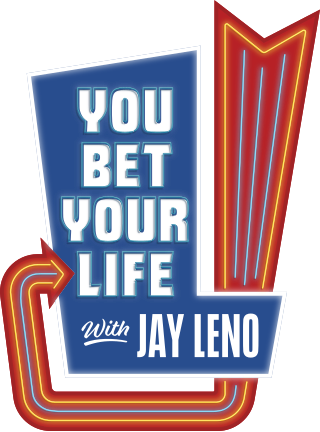Related Research Articles

Hollywood Squares is an American game show in which two contestants compete in a game of tic-tac-toe to win cash and prizes. The show piloted on NBC in 1965 and the regular series debuted in 1966 on the same network. The board for the game is a 3 × 3 vertical stack of open-faced cubes, each occupied by a celebrity seated at a desk and facing the contestants. The stars are asked questions by the host and the contestants judge the truth of their answers to gain squares in the right pattern to win the game.

Lingo is an American television game show with multiple international adaptations. In it, contestants compete to decode five-letter words given the first letter, similarly to Jotto, with each correctly guessed word earning number draws to attempt filling in a Bingo card.

Win, Lose or Draw is an American television game show that aired from 1987 to 1990 in syndication and on NBC. It was taped at CBS Television City, often in Studios 31, 33, and 43 at various times. It was co-produced by Burt & Bert Productions and Kline & Friends for Disney's Buena Vista Television. It has also had two versions on The Disney Channel: Teen Win, Lose or Draw from 1989 to 1992, and a revived version known as Disney's Win, Lose or Draw which aired in 2014. New York described Win, Lose or Draw as "a knockoff" of the board game Pictionary, however, Burt Reynolds and Ed McMahon referred to playing the game at Burt's home during the August 2, 1978 episode of The Tonight Show, with Johnny Carson, three years before Pictionary was created.

You Bet Your Life is an American comedy quiz series that has aired on both radio and television. The original version was hosted by Groucho Marx of the Marx Brothers, with announcer and assistant George Fenneman. The show debuted on ABC Radio on October 27, 1947, moved to CBS Radio debuting October 5, 1949, and went to NBC-TV and NBC Radio on October 4, 1950. Because of its simple format, it was possible to broadcast the show on both radio and television but not simultaneously. Many of the laughs on the television show were evoked by Groucho's facial reactions and other visual gimmicks; the two versions were slightly different. The last episode in a radio format aired on June 10, 1960. The series continued on television for another year, recording a season on September 22, 1960 with a new title, The Groucho Show.
The Joker's Wild is an American television game show that aired at different times between 1972 and 2019. In the show, contestants answer questions based on categories determined randomly by a mechanism resembling a slot machine. The show's title refers to the game's slot-machine mechanism also having jokers.

Now You See It is an American television game show created by Frank Wayne for Mark Goodson-Bill Todman Productions. The object of Now You See It is to answer general knowledge trivia questions by finding the answers hidden in a grid, similar to a word search puzzle.

Chain Reaction is an American television game show created by Bob Stewart, in which players compete to form chains composed of two-word phrases.

Get the Picture is a children's game show that aired from March 18 to December 6, 1991, with repeats until March 13, 1993 on Nickelodeon. Hosted by Mike O'Malley, the show featured two teams answering questions and playing games for the opportunity to guess a hidden picture on a giant screen made up of 16 smaller screens. The show was recorded at Nickelodeon Studios in Universal Studios, Orlando, Florida. The program's theme music and game music was composed by Dan Vitco and Mark Schultz, and produced by Schultz. Its tagline is The Great Frame Game.
Time Machine is an American game show where contestants compete to answer trivia questions about popular culture and recent history to win prizes. The show aired on NBC from January 7 through April 26, 1985, and was hosted by John Davidson. Charlie Tuna was the announcer, with Rich Jeffries as his substitute. Reg Grundy Productions produced the series, and upon its premiere Time Machine was one of three Grundy series airing on NBC.

Telly Addicts was a British television game show that aired on BBC One from 3 September 1985 to 29 July 1998, and hosted by Noel Edmonds. All questions were based on television programmes past and present, and generally took the form of a short clip being shown followed by a series of questions either specifically about the clip or more generally about the programme from which it had been taken. Two teams sat opposite each other on sofas. The final series in 1998 had three teams of two players.

Wheel 2000 is a children's version of the American game show Wheel of Fortune, produced by Scott Sternberg Productions and Columbia TriStar Television. The show was created by Scott Sternberg and was hosted by David Sidoni, with Tanika Ray providing voice work and motion capture for a virtual reality hostess named "Cyber Lucy".
Couch Potatoes is an American game show which featured two teams competing in a television-centric quiz game. The program premiered in syndication on January 23, 1989. It aired in first-run until June 9, 1989, for a total of one hundred episodes, and reruns aired after that until September 8, 1989.
PDQ and Baffle are American television game shows created by Heatter-Quigley Productions. Both shows' objective was for contestant/celebrity teams to guess a given word or phrase in the shortest amount of time with the fewest letters given as possible.
My Kind of Music was a British game show that aired on ITV from 8 February 1998 to 29 March 2002 and is hosted by Michael Barrymore.

Three for the Money is an American game show produced by Stefan Hatos-Monty Hall Productions that aired on NBC from September 29 to November 28, 1975. Dick Enberg was the host with Jack Clark announcing. Enberg was also hosting Sports Challenge at the time and had just joined NBC's sports division.
La ruleta de la fortuna or La ruleta de la suerte is the Spanish version of Wheel of Fortune. The first incarnation ran from 1990 to 1992 in Antena 3, the second one from 1993 to 1997 in Telecinco, and then, after a nine-year hiatus, a revival has been made on Antena 3 beginning in 2006. The show also airs internationally via Antena 3 Internacional.

BrainRush is a live-action game show on Cartoon Network, hosted by Lamorne Morris and, to a lesser extent, Sarah Karges. It first aired on June 20, 2009, with its last episode airing on July 22, ending after one season. It was part of Cartoon Network's late-2000s phase of live-action programming.
The Main Event was a weekly hour-long Australian game show that aired on the Seven Network from 1991 to 1992. The show was hosted by Larry Emdur, with Don Blake and Niel Chantler as announcers.

Celebrity Name Game is an American syndicated game show that premiered on September 22, 2014. Based on the board game Identity Crisis, the series was developed by Courteney Cox and David Arquette's Coquette Productions, and was originally pitched as a primetime series for CBS with Craig Ferguson as host. The series was later picked up by FremantleMedia and Debmar-Mercury as a syndicated series for 2014 with Ferguson, who left The Late Late Show on December 19, 2014, remaining as host as well as an executive producer. The series marks Coquette's first foray into game shows. The show was subsequently renewed for a second season, which premiered on September 21, 2015.

America Says is an American television game show hosted by John Michael Higgins and broadcast on Game Show Network. The series consists of two teams of four guessing the top answers to fill-in-the-blank survey questions. It is a restructuring of the Audience Match portion of Match Game.
References
- ↑ "CBS kicks off 'The Hollywood Game'". The Beatrice Sun. June 13, 1992. p. 27. Retrieved November 15, 2021.
- ↑ "Game show for show biz". Great Falls Tribune. June 19, 1992. pp. 3D. Retrieved November 15, 2021.